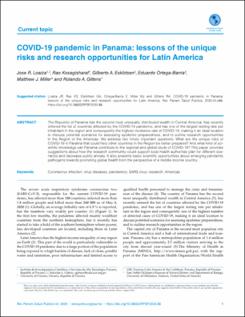| dc.contributor.author | Loaiza, Jose R. | |
| dc.contributor.author | Kosagishara, Rao | |
| dc.contributor.author | Eskildsen, Gilberto A. | |
| dc.contributor.author | Ortega-Barria, Eduardo | |
| dc.contributor.author | Miller, Matthew J. | |
| dc.contributor.author | Gittens, Rolando A. | |
| dc.date.accessioned | 2020-06-30T05:56:13Z | |
| dc.date.available | 2020-06-30T05:56:13Z | |
| dc.date.issued | 2020-06 | |
| dc.identifier.other | https://doi.org/10.26633/RPSP.2020.86 | |
| dc.identifier.uri | http://repositorio-indicasat.org.pa/handle/123456789/142 | |
| dc.description | The Republic of Panama has the second most unequally distributed wealth in Central America, has recently entered the list of countries affected by the COVID-19 pandemic, and has one of the largest testing rate per inhabitant in the region and consequently the highest incidence rate of COVID-19, making it an ideal location to discuss potential scenarios for assessing epidemic preparedness, and to outline research opportunities in the Region of the Americas. We address two timely important questions: What are the unique risks of COVID-19 in Panama that could help other countries in the Region be better prepared? And what kind of scientific knowledge can Panama contribute to the regional and global study of COVID-19? This paper provides suggestions about how the research community could support local health authorities plan for different scenarios and decrease public anxiety. It also presents basic scientific opportunities about emerging pandemic pathogens towards promoting global health from the perspective of a middle income country | en_US |
| dc.description.abstract | The Republic of Panama has the second most unequally distributed wealth in Central America, has recently entered the list of countries affected by the COVID-19 pandemic, and has one of the largest testing rate per inhabitant in the region and consequently the highest incidence rate of COVID-19, making it an ideal location to discuss potential scenarios for assessing epidemic preparedness, and to outline research opportunities in the Region of the Americas. We address two timely important questions: What are the unique risks of COVID-19 in Panama that could help other countries in the Region be better prepared? And what kind of scientific knowledge can Panama contribute to the regional and global study of COVID-19? This paper provides suggestions about how the research community could support local health authorities plan for different scenarios and decrease public anxiety. It also presents basic scientific opportunities about emerging pandemic pathogens towards promoting global health from the perspective of a middle income country | en_US |
| dc.language.iso | eng | en_US |
| dc.rights | https://creativecommons.org/licenses/by-nc-n/d/3.0/igo | |
| dc.rights | info:eu-repo/semantics/openAccess | |
| dc.subject | Coronavirus infection | en_US |
| dc.subject | virus diseases | en_US |
| dc.subject | pandemics | en_US |
| dc.subject | SARS virus | en_US |
| dc.subject | research | en_US |
| dc.subject | Americas | en_US |
| dc.title | COVID-19 pandemic in Panama: lessons of the unique risks and research opportunities for Latin America | en_US |
| dc.type | info:eu-repo/semantics/article | en_US |
| dc.type | info:eu-repo/semantics/publishedVersion | |

